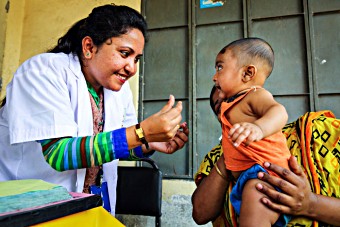Gavi works with the Global Polio Eradication Initiative (GPEI) to support one of the fastest roll-outs of a new vaccine in the history of vaccination.

Five-month-old Shuvo is about to be vaccinated at a health centre in Dhaka, Bangladesh, during the launch of IPV and pneumococcal vaccine.
Credit: Gavi/2015/GMB Akash.
In partnership with GPEI, we support the introduction of at least one dose of inactivated polio vaccine (IPV) in all Gavi-supported countries.
40 million children vaccinated
By the end of 2016, 54 countries had added IPV to their routine immunisation schedules, with 16 launching in 2016 alone. So far, more than 40 million children have been protected thanks to Gavi support. IPV coverage in Gavi-supported countries more than trebled from just 12% in 2015 to 39% in 2016.
But the sheer pace and scale of the introductions, coupled with the technical difficulties of increasing production, have led to severe supply constraints. Manufacturers were only able to deliver 50% of projected supply in 2016, delaying or interrupting programmes in some countries. Priority is given to countries at high risk of polio outbreaks to make sure they are not among those affected by supply constraints.
WHO’s Strategic Advisory Group of Experts (SAGE) has advised countries to consider switching to fractional doses of IPV to help mitigate global supply shortages. This approach, adopted by Bangladesh, India and Sri Lanka, provides protection while reducing the risk of vaccine stock-outs.
Routine immunisation key to eradication
“We cannot and will not rest as long as any child anywhere in the world is at risk of contracting this terrible disease. Gavi fully supports the Global Polio Eradication Initiative and partners, and we will continue to work together as we edge ever closer to a polio-free world.
Dr Ngozi Okonjo Iweala, Gavi Board Chair
In a major setback to the global effort to eradicate polio, four cases of wild polio virus were detected in northern Nigeria in August 2016. This came nearly three years after the last confirmed case and just before Nigeria was due to be declared polio-free. Nigeria had introduced IPV just over a year before, with a reported coverage rate of 49% in 2016.
With polio still endemic in three countries – Afghanistan, Nigeria and Pakistan – the target date for global certification of eradication has been pushed back by at least two years – from 2018 to 2020 at the earliest.
The Nigerian outbreak is a timely reminder of the difficulties of eliminating disease when health systems are weak and levels of routine immunisation low. Only through high routine immunisation coverage can this devastating disease be eradicated for good.
Related links

A tale of two cities – how Gavi collaborates with GPEI in Pakistan

Gavi’s support for inactivated polio vaccine

